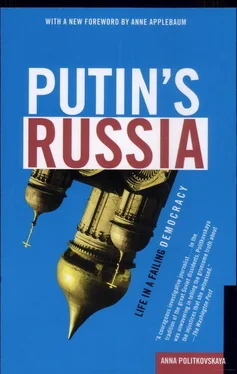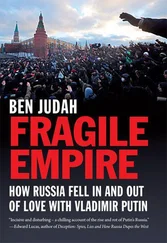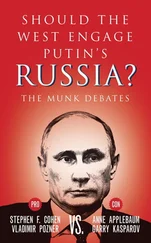Where were the officers? That night they, too, were drinking themselves senseless and were physically incapable of being in charge of anything. At around six in the morning, Yury Diachenko was found in the provisions depot. He had hanged himself.
ALTHOUGH SIBERIA IS not Chechnya—it is far removed from the war—the distance makes no difference. Valerii Putintsev, a young man born in Tyumen Province, was posted to the Krasnoyarsk Region to serve in the district town of Uzhur, in the elite units of the strategic missile forces. His mother, Svetlana Putintseva, was delighted. Because they were dealing with the most up-to-date and dangerous weaponry on the planet, officers in the missile units were considered to be the best educated in the army, not likely to get drunk or to beat up conscripts, and likely to maintain discipline. Soon, however, she, too, began to receive distressing letters from her son, in which he wrote that the officers were no better than “jackals”:
Hello, Mom! I don’t want this letter to be seen by anyone other than you. In particular, please keep what I am writing from Gran. We both know the score there, and I’m sure you won’t undermine what health she has left. I worry about her a lot. I can’t accept that I have to work as a slave to benefit people I despise. More than anything in the world, I want to work for the good of my own people, to better my family. It’s only since being here that I have understood how important you all are….
Valerii was never to return to work for the good of his people. The officers in the Uzhur barracks robbed the soldiers of everything they had, degrading any who, like Valerii, tried to defend their dignity. In the half year he spent in his unit, four soldiers were carried out in coffins, all of them privates, all of them beaten to death.
The officers’ first game was to confiscate Valerii’s uniform (the soldiers have no clothing apart from their uniforms). They told him that now he had to ransom it. They assumed he would write home and ask for money to be sent as a matter of urgency. Valerii resisted. He knew that his mother lived very modestly with his grandmother, an old-age pensioner, his sister, and her little daughter, and could ill afford to send him money. As a result of his concern for his family, he was brutally and repeatedly beaten. In the end, he had had enough. He turned on the officers and was sent to the guardhouse for insubordination. Pretending he was attempting to escape, they wounded him badly. Svetlana Putintseva became anxious and called the unit’s commanding officer, Lieutenant Colonel Butov, who she says informed her that he knew how to beat people so as not to leave any trace. Svetlana dropped everything and flew straight to Uzhur, where she found her son at death’s door. He had gunshot wounds to the pelvis, the bladder, the ureter, and the femoral artery. In the hospital his mother was told to find blood for a transfusion: “Urgently! We have no blood here.” Alone in a strange town, she was expected to find donors. She rushed back to the army unit to ask for help. The commanding officer refused. She scrambled through the city, trying to save her son. She failed. Valerii, lacking a transfusion, died, on February 27, 2002. In one of his last letters, he had written to Svetlana, “I wasn’t expecting much help from the officers. All they are capable of is humiliating people.”
BACK TO MOSCOW Province. It is the morning of May 4, 2002. Army Unit 13815, in the village of Balashikha. Two boilerwomen working in the plant that provides heating for the unit hear cries for help from nearby. They rush out and see that a trench has been dug in the middle of the courtyard, in which a soldier has been buried up to his neck. The women dig down, cut the rope binding him hand and foot, and help him out of the pit.
At this moment an army major appears in a towering rage. He shouts at the women to leave the soldier alone. He is teaching Private Chesnokov a lesson, and if they do not go back to the boilerhouse immediately, he will have them sacked.
Private Chesnokov, having escaped from the pit, deserted from the unit.
THE RUSSIAN ARMY has always been a fundamental pillar of the state. To this day, it is mostly a prison camp behind barbed wire where the country’s young are locked up without trial. It has prisonlike rules imposed by the officers. It is a place where beating the hell out of someone is the basic method of training. This, incidentally, is how Putin, when he first took the Kremlin throne, described the way he would deal with enemies within Russia.
It may be that the president finds this state of affairs agreeable, with his lieutenant colonel’s epaulettes and his two daughters who will never have to serve in such an army. The rest of us—apart from the officer caste, who revel in their status as petty gangsters above the law—are deeply unhappy about the situation. This is especially true of those who have sons, and all the more so if the young men are of conscription age. These families have no time to wait for the military reforms they have been promised for so long. They fear that their sons will leave home only to be sent straight to a training ground or to Chechnya or to some other place from which there is no return.
OUR NEW MIDDLE AGES, OR WAR CRIMINALS OF ALL THE RUSSIAS
We currently have two kinds of war criminals in Russia. The crimes of both relate to the second Chechen war, which began in August 1999 just as Vladimir Putin was appointed prime minister. The war—a feature of his first presidential term—continues to this day.
All the war-crimes prosecutions that have occurred have had one common attribute: their outcome has been determined on ideological rather than on legal grounds. Inter arma silent leges: In time of war, the laws are silent. Those found guilty have been sentenced, not after due process but in accordance with the ideological winds blowing from the Kremlin.
The first kind of war criminal is someone who was, in fact, involved in military conflict—for example, an army soldier engaged in the “antiterrorist operation” in Chechnya, or a Chechen fighter who opposed the army. The former is always cleared of his crime; the latter, treated with scant regard for the law, is charged with a crime. The former is acquitted by the judicial system even where there is manifest proof of guilt (which is rare, since the prosecutor’s office usually makes no attempt to collect evidence). The latter is given the severest sentence possible.
The best-known federal case is that of Colonel Yury Budanov, commanding officer of the 160th Tank Regiment. On March 26, 2000, the day Putin was elected president, Budanov abducted, raped, and murdered an eighteen-year-old Chechen girl, Elza Kungaeva, who lived with her parents in the village of Tangi-Chu, on the outskirts of which Budanov’s regiment was temporarily deployed. We’ll examine Budanov’s experiences later in this chapter.
The best-known Chechen case is that of Salman Raduev. Raduev was a renowned Chechen field commander, a brigadier who had been carrying out terrorist raids since the first Chechen war, when he had commanded what was known as the army of General Dudaev. Raduev was caught in 2001, sentenced to life imprisonment, and died in mysterious circumstances in Solikamsk high-security prison. Solikamsk is an infamous prison city, nestled among salt mines in Perm Province, in the Urals, a place of exile since czarist times. Raduev was a symbol of those fighting for Chechen freedom from Russia. There are many cases like his; as a rule, they are heard behind closed doors, to conceal information from the public. The need for such hush-hush activity is often obscure. Occasionally it is possible, with great difficulty and in great secrecy, to obtain the court records of cases brought against Chechen fighters. The accused are usually found guilty; no time is wasted on the collection and consideration of evidence.
Читать дальше





![Stephan Orth - Behind Putin's Curtain - Friendships and Misadventures Inside Russia [aka Couchsurfing in Russia]](/books/415210/stephan-orth-behind-putin-s-curtain-friendships-a-thumb.webp)






